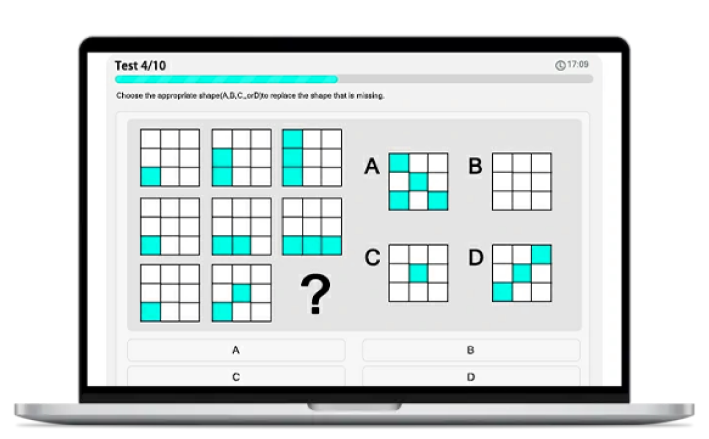
FAQ's
Have questions? Here you’ll find the answers most valued by our partners, along with access to step-by-step instructions and support.
Frequently Asked Questions
Your score on the IQ test is categorized into different intervals, each representing a specific cognitive designation:
- 55 – 69: Challenged (2.1% of test takers) - This score range indicates challenges in traditional cognitive tasks.
- 70 – 84: Below average (13.6% of test takers) - A score in this range suggests lower cognitive ability relative to the general population.
- 85 – 115: Average (68.2% of test takers) - This is the range where most people score, indicating typical intelligence.
- 116 – 129: Above average (13.6% of test takers) - Scores in this range suggest higher-than-average cognitive abilities.
- 130 – 144: Gifted (2.1% of test takers) - This score range is associated with higher intellectual capabilities and problem-solving skills.
- 145 – 159: Genius (Less than 1% of test takers) - A score within this interval indicates exceptional intellectual ability.
The test includes a range of puzzles and questions designed to evaluate various aspects of your intelligence. It challenges your short-term memory, analytical thinking, mathematical skills, and spatial recognition. By addressing these diverse cognitive functions, the test provides a detailed insight into your intellectual capabilities, highlighting both your strengths and areas for potential growth.
The test includes a range of puzzles and questions designed to evaluate various aspects of your intelligence. It challenges your short-term memory, analytical thinking, mathematical skills, and spatial recognition. By addressing these diverse cognitive functions, the test provides a detailed insight into your intellectual capabilities, highlighting both your strengths and areas for potential growth.
The test comprises various puzzles and questions that challenge different cognitive functions, including short-term memory, analytical thinking, mathematical ability, and spatial recognition. These assessments are available online or via our mobile apps, offering a detailed overview of your intellectual strengths and areas for improvement.
Yes, our IQ test results are very accurate and reliable. We use scientifically validated testing methods and adhere to stringent quality control procedures to maintain the accuracy of our results. Our tests have undergone rigorous validation processes and are conducted by qualified professionals.
Yes, you have the choice to share your IQ test results with others.
Increasing your cognitive abilities can be achieved through various methods, such as engaging in brain exercises, learning new skills, reading, solving puzzles, and maintaining a healthy lifestyle that includes proper diet and regular physical exercise.
The average IQ is set at 100, with about 68% of people scoring between 85 and 115
You can check your IQ level by taking our online IQ test. After completing the test, you will receive a score that estimates your IQ level based on your answers.
An intelligence test, or IQ test, is a standardized assessment designed to measure human intelligence and cognitive ability. It consists of various tasks measuring various aspects of intelligence, including memory, reasoning, problem-solving, and comprehension.
Yes, you can retake the IQ test if you wish to improve your score or reassess your cognitive abilities. We recommend waiting for a reasonable period between attempts to ensure that the results are reflective of your current intellectual capabilities.
Yes, our IQ test is designed to be accessible for people who do not speak English well. The test is primarily based on images and visual puzzles, minimizing the reliance on language skills and allowing for a more accurate assessment of cognitive abilities regardless of language proficiency.
Start Your Test Experience
Here

